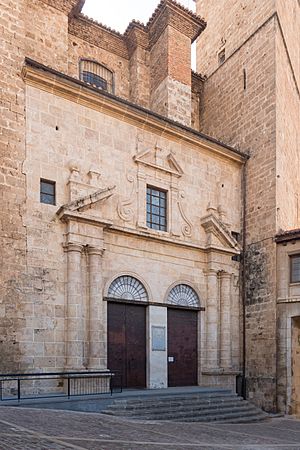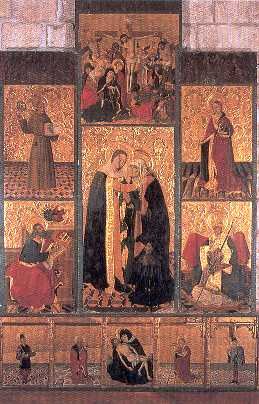Segorbe Cathedral facts for kids
Quick facts for kids Cathedral of the Assumption of Our LadyCatedral de la Asunción de la Virgen |
|
|---|---|

View of the façade of the Cathedral of Segorbe.
|
|
| Religion | |
| Affiliation | Roman Catholic Church |
| Ecclesiastical or organizational status | Cathedral, minor basilica |
| Leadership | B. Casimiro López Llorente |
| Year consecrated | 1534 |
| Location | |
| Location | Segorbe, Spain |
| Architecture | |
| Architectural type | Church |
| Architectural style | Valencian Gothic, Neoclassical |
| Groundbreaking | 1246 |
| Completed | 17th century |
| Official name: Santa Iglesia Catedral Basílica de Santa María de la Asunción | |
| Designated | 24 September 2002 |
| Reference no. | (R.I.)-51-0009270 |
The Cathedral of the Assumption of Our Lady of Segorbe is a beautiful and historic church located in Segorbe, a town in Spain. It's also known as the Cathedral of the Assumption of the Virgin. This important building is the main church for the Diocese of Segorbe-Castellon. In 1985, it was given the special title of a minor basilica, which means it's a very important church with special ties to the Pope.
Contents
History of the Cathedral
Building a New Church
The Cathedral of Segorbe is built right against the old city walls. Long ago, this spot was home to a mosque. But in 1246, a new church was built here. It was designed in the Valencian Gothic style, which was popular in the region. This new building was so completely rebuilt that there are no signs left of the old mosque.
From that 13th-century church, some parts still remain today. These include parts of the western front, the arched ceilings of some small chapels, and the strong load-bearing walls. The tower of Santa Barbara, the bell tower, and the cloister (an open courtyard) are also original parts. The church was officially opened on May 7, 1534. It has one main hall, called a nave, with a cross-vaulted ceiling. There are no side sections (transept) or a dome. Small chapels are built between the strong support walls, called buttresses. A bridge connects the cathedral to the old bishop's palace.
Key Features and Changes
The bell tower looks very solid and has a square shape. Its simple design is typical of Romanesque style. It stands tall at about 36 meters (118 feet). The Gothic cloister has a unique trapezoid shape and two levels. The lower level was built between the 14th and 15th centuries. The upper level was added later, in the late 15th and early 16th centuries. The main front of the cathedral was built in 1665.
The area around the main altar, called the presbytery, was updated in the 16th century in a Renaissance style. The large main altar was also added around 1530. It was designed by a famous artist named Vicente Juan Masip. The church walls are decorated with beautiful paintings called frescoes, created by Luis Planes.
Between 1791 and 1795, the church was renovated again. This time, it was changed to the Neoclassic style. This renovation almost completely covered up the original Gothic design. The main hall was made longer, and new altars were added.
Cathedral Museum
The Cathedral of Segorbe also has a museum inside! This museum displays many artworks by artists from the local area and other countries. You can see art from different periods, including the International Gothic style, 15th-century Flemish painting, and the 16th-century Valencian school. There are also more recent artworks.
Some of the artists whose works are displayed include Jaume Mateu, who created the St. Jerome Altarpiece around 1450. You can also see two 16th-century altarpieces by Vicente Juan Masip and his son Juan. There is even a work believed to be by the famous Italian artist Donatello.
See also
 In Spanish: Catedral de la Asunción (Segorbe) para niños
In Spanish: Catedral de la Asunción (Segorbe) para niños
 | Charles R. Drew |
 | Benjamin Banneker |
 | Jane C. Wright |
 | Roger Arliner Young |


